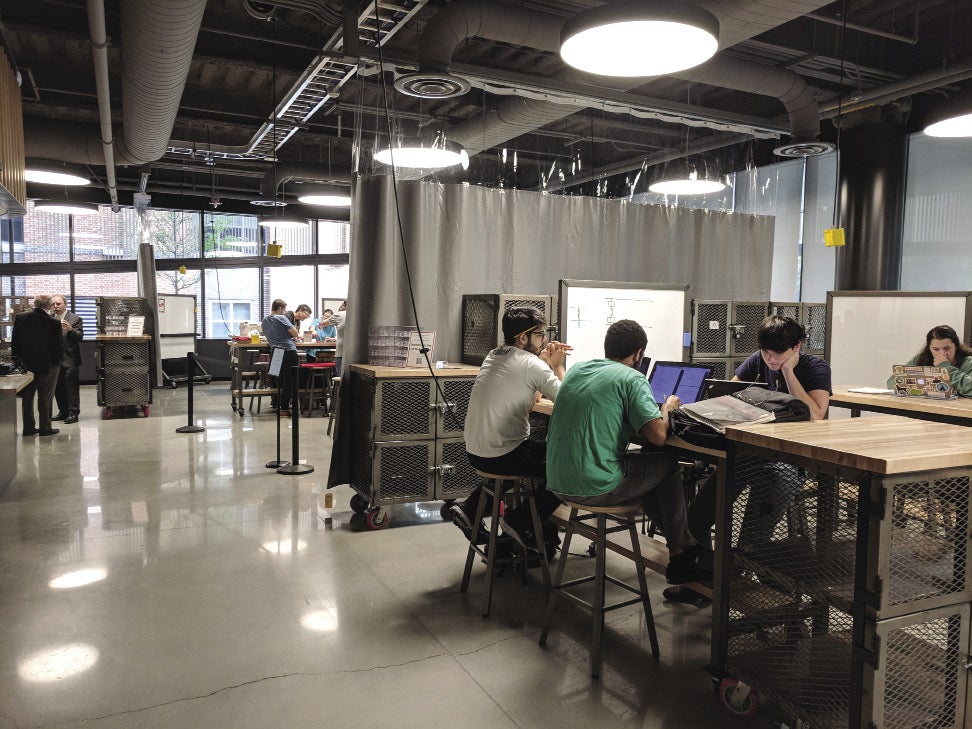
More Information
When Becker College in Worcester announced it will be closing its doors in August, the Massachusetts Digital Games Institute had a big question to answer. The statewide center for video game entrepreneurship, known as MassDiGi, had been based at the college since its start a decade ago. Where would it go now?
“We were flattered by the range of institutions that were interested in talking with us,” said CEO Timothy Loew. “We had opportunities across the commonwealth, and really great ones.”
Ultimately, though, MassDiGi decided to move just a few blocks away, to Worcester Polytechnic Institute.
Timothy Loew, MassDiGi CEO
The decision reflects WPI’s world-renowned video game development programs, but it also speaks to a larger theme: the strong and growing ties between the city’s colleges and the development of new businesses with students or new graduates at their helms.
Jeanine Belcastro Went, executive director of the Higher Education Consortium of Central Massachusetts, said in an email local colleges have a range of programs to support students’ development of business ideas.
Jeanine Belcastro Went, HECCMA
Some offer access to startup labs and fabrication labs, and many have business development tracks built into their curriculum.
“In the past, several HECCMA colleges have worked with students to tap into local startup locations like Running Start, Idea Lab, and Technocopia to help develop and incubate their entrepreneurial ideas,” Went said.
Building partnerships
Karen Pelletier, the Worcester Regional Chamber of Commerce’s executive vice president, said her first role at the chamber when she arrived seven years ago was promoting partnerships between business and institutes of higher education.
Karen Pelletier, Worcester Regional Chamber of Commerce
“The chamber took on that new position recognizing that retaining college student talent was just a critical issue for our community,” she said.
Pelletier and others have worked to ensure students have chances to intern at local businesses, get support from established entrepreneurs, and take advantage of the city’s programs for small business owners.
She said the Worcester Business Resource Alliance, a coalition of local groups, can help connect prospective student founders with help in navigating licenses and regulations, financing their startups, locating coworking spaces and more.
In April, the chamber and its partners won a state grant to launch an incubator and accelerator project known as the Central Massachusetts Startup Consortium that Pelletier said will act as a roadmap for new businesses.
The chamber partners with WPI’s Venture Forum and the business incubator and coworking space WorcLab to run an annual program known as StartUp Worcester to help young entrepreneurs get their businesses off the ground.
One prominent alumnus of the program is Aaron Birt, a WPI graduate and engineer who founded Solvus Global and was named to the 2018 Forbes 30 under 30 list.
Another is Stacy Chin, who got her bachelor’s degree from the College of the Holy Cross in Worcester and went on to become CEO of HydroGlyde Coatings, which has received $500,000 in funding from the Bill & Melinda Gates Foundation, the National Institutes of Health and the Massachusetts Life Sciences Center.
Strong ties
All of Worcester’s colleges and universities now have entrepreneurship programs, Pelletier said, a shift from when she started working with them seven years ago.
“You kind of had to find the right person on campus who even knew what a startup was,” she said. “It’s definitely more popular now.”
At Worcester State University, for example, students can participate in the semester-long IDEA Accelerator program to test their business ideas.
Holy Cross has a student-run incubator called HC Launch and an entrepreneurship week featuring a Shark Tank-style competition. Clark University students can apply to get their fledgling business a spot in a storefront space operated by the student-run Clark Collective.
Loew said the rise of these kinds of programs is partly due to increased student interest in an entrepreneurial career path.
“Young people come to college thinking that maybe they want to have that kind of control over their career and their life,” he said. “It’s something that is visible enough and common enough around here that it’s kind of just in the water at this point.”
Looking at game development alone, Loew said ties between academic programs and local companies are strong in Worcester.
Photo | Courtesy of Clark University
Clark University students walk to class.
“Worcester has a real strength in game design, game development, from an academic perspective,” he said. “WPI and now Clark have two of the top programs in the country, and that’s pretty unique. I don’t think there’s another community that can say it has the density of academic programs and activities related to games as this one.”
One success story is Petricore Games, a six-year-old game design company that got its start at MassDiGi and is still headquartered in Worcester.
Other MassDiGI alumni include Zephyr Workshop, a board game company now operating from Washington state, and Snoozy Kazoo, a West Springfield company releasing in April its much-anticipated, wonderfully named indie game “Turnip Boy Commits Tax Evasion.”
Regardless of the industry, Loew said, he expects entrepreneurial students to see even more opportunity as the economy recovers from the pandemic recession.
“You’ll start to see, post-pandemic, a tremendous amount of entrepreneurship programs and activities kind of oozing out across the community,” he said. “There’s no time like the present to start something if you’ve been thinking about it.”
"help" - Google News
May 24, 2021 at 05:03PM
https://ift.tt/3uhZKi1
Worcester's colleges have fostered a startup ecosystem to help students become business owners - Worcester Business Journal
"help" - Google News
https://ift.tt/2SmRddm
Bagikan Berita Ini














0 Response to "Worcester's colleges have fostered a startup ecosystem to help students become business owners - Worcester Business Journal"
Post a Comment